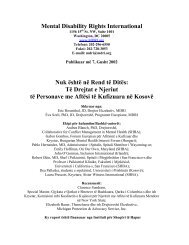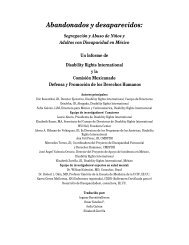Torture not Treatment - Disability Rights International
Torture not Treatment - Disability Rights International
Torture not Treatment - Disability Rights International
You also want an ePaper? Increase the reach of your titles
YUMPU automatically turns print PDFs into web optimized ePapers that Google loves.
TORTURE NOT TREATMENT<br />
Massachusetts law permits torture or inhumane treatment<br />
Despite extensive procedural protections, Massachusetts law fails to provide the protections<br />
required by the UN Convention against <strong>Torture</strong>. The law creates extensive requirements of<br />
professional and judicial review. If the person goes through all procedural requirements, the<br />
final decision comes down to a balance between the symptoms of the disorder against the risks of<br />
treatment. In practice, JRC can claim these symptoms are extremely dangerous or lifethreatening,<br />
providing justification for the infliction of correspondingly painful and dangerous<br />
treatment. In such circumstances, there is no upper limit on the amount of pain that can be<br />
imposed short of killing a person. Where a disability is severe and can be characterized by<br />
treating authorities as dangerous, Massachusetts law permits severely painful treatments to be<br />
imposed on an individual. The very definition of Level III aversives is that they create ―a<br />
significant risk of physical or psychological harm‖ to the individual. The UN Convention<br />
against <strong>Torture</strong> requires that governments protect their citizens against the infliction of severe<br />
pain. The Massachusetts regulations of aversive treatment fail that test.<br />
MDRI contends the pain induced at JRC by electric shock, restraints, and social isolation can rise<br />
to the level prohibited by the UN Convention against <strong>Torture</strong> as ill-treatment or torture. The fact<br />
that individuals have disabilities, they are placed in institutions by parents who have consented to<br />
treatment on their behalf, and they are in a position of complete powerlessness at the hands of<br />
state authorities, renders this form of mistreatment a form of torture.<br />
Some of the practices at JRC may go beyond what is permissible under Massachusetts law.<br />
Once aversives are approved, for example, JRC admits that they are used to stop behaviors that<br />
are <strong>not</strong> necessarily dangerous or life-threatening. The logic of the ―behavioral rehearsal lesson‖<br />
justified students with non-dangerous behaviors to be subjected to the most painful aversives<br />
because they could lead to more dangerous behaviors. Using this logic, once a court approves<br />
aversives for the most dangerous behaviors, JRC then acts as if it has license to use aversive<br />
treatment on any and all non-dangerous behaviors that it can argue might lead to dangerous<br />
behavior.<br />
JRC practices in this regard appear to violate Massachusetts law. The use of Level III aversives<br />
are supposed to be restricted to behaviors that are ―difficult or dangerous behavioral problems,‖<br />
such as ―serious self-mutilation or other self-destructive acts.‖ 174 JRC commonly imposes<br />
aversive treatments that are well out of proportion to the risk of the underlying behavior. The fact<br />
that JRC has the capacity to abuse judicially approved aversives demonstrates the danger of<br />
permitting any aversives.<br />
31




